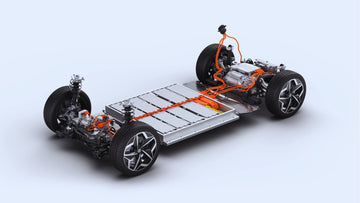
Electric Car Batteries: Challenges, Tips, and Future Prospects
The battery is the heart of any electric vehicle (EV), but it also presents some of the biggest challenges in the push toward emissions-free driving. It accounts for an astonishing 40-60% of the vehicle's cost, making it a significant factor in the overall expense. Batteries are not only expensive to produce but also heavy, which adds to transportation costs.
Hero or Villain?
Hero
Your EV's battery is what sets it apart from traditional gas-powered cars. It stores the electricity that powers your vehicle, allowing it to run quietly and without emissions. Without the battery, there would be no whisper-quiet rides or zero emissions. Three cheers for this essential component!
Villain
Cost of Ownership
The high price of batteries significantly impacts the overall cost of EVs. Manufacturers estimate that EV batteries should last between 10 and 20 years, but it's difficult to predict their longevity accurately since electric cars are relatively new. Early models like the Nissan Leaf used older battery technologies, making them poor benchmarks for today's batteries.
Batteries will inevitably fail, sometimes due to manufacturing defects or covered events, but often due to wear and tear or misuse. When owners have to cover the replacement costs, it could be as high as £15,000, compared to under £500 for replacing a leaky petrol tank. The lesson here is clear: take good care of your battery.
Weight Issues
Electric cars are heavier than their petrol counterparts, which translates to more wear and tear on components like suspension, wheel bearings, brakes, and tires. These parts will wear out quicker, increasing maintenance costs.
Environmental Impact
While EVs are free of fuel emissions, they are not entirely emission-free. The weight of the battery contributes to increased wear on tires and brakes, which release polluting particles into the environment. This particulate pollution, harmful especially to children, can lead to serious health issues like heart attacks, strokes, and respiratory diseases.
Addressing the Challenges
These challenges are not reasons to abandon EVs but issues to be addressed and solved. The transition to electric vehicles is essential given the realities of climate change, air pollution, and finite oil reserves. The goal should be to build better and greener batteries.
The Future of EV Batteries
A promising advancement in EV battery technology is the development of solid-state batteries. These batteries offer greater energy storage density than current lithium-ion batteries, meaning they can hold more energy, last longer, charge faster, and be smaller and lighter. They are also safer, with a lower risk of fire or explosion due to their high thermal stability.
Toyota plans to release solid-state car batteries by 2027 or 2028, claiming a range of up to 1200km on a single charge, compared to the current 700km limit of many EVs.
Maintenance Tips for Your EV Battery
- Avoid fast-charging whenever possible.
- Avoid fully draining the battery and then fully charging it.
- Maintain a charge between 20% and 80%.
- Protect the battery from extreme temperatures.
Recycling and Reusing Batteries
No battery lasts forever, but lithium-ion and solid-state batteries can be recycled or repurposed. Many companies are finding profitable opportunities in battery reclamation. For example, Jaguar Land Rover plans to repurpose old car batteries to store surplus energy for the national grid, feeding power back during peak times.
The Road Ahead
Significant work remains before electric cars fully realise their environmental benefits, but progress is being made. Despite governmental reluctance to invest heavily, the potential for profit is driving improvements in EV technology. While corporate motives may focus on profit rather than the planet's health, the result is a positive change for both.
